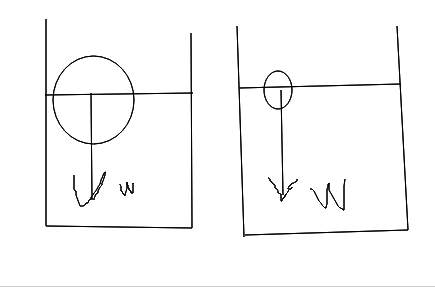
If we have two objects with the same mass but different densities (lets assume object 1 is denser, therefore volume is lower relative to object 2).assume both objects have a lower density than water. now if we put both in water, both will float. since they float, buoynacy force is equal to the weight of the object, so buoynacy force in 1 and 2 should be equal .however if we use f(boyancy)=pvg--> then becuase the submerged v is less for the denser object and p fluid is the same, then we can conclude that f bouynacy are not the same for both objects. true or false?


Answers: 2
Another question on Physics

Physics, 21.06.2019 20:30
Aforce of 240.0 n causes an object to accelerate at 3.2 m/s2. what is the mass of the object?
Answers: 1

Physics, 22.06.2019 01:00
Asuppose a suitcase has a mass of (m) 30 kg and a net force (n) of 10 kg*m/s. what is the acceleration rate of the suitcasein m/s? show your work to support your answer.
Answers: 3

Physics, 22.06.2019 06:30
Suppose you have a box. which of these is not necessarily a true statement regarding the relationship between the force applied to the box, the work done on the box, and the distance the box is moved? a. if the box is not moved, no force is being applied to the box. b. if no force is applied to the box, no work is done on the box. c. if work is done on the box, then a force is applied to the box. d. if work is done on the box, then the box is moved a distance.
Answers: 2

You know the right answer?
If we have two objects with the same mass but different densities (lets assume object 1 is denser, t...
Questions

Mathematics, 27.12.2019 02:31



Mathematics, 27.12.2019 02:31

History, 27.12.2019 02:31

Mathematics, 27.12.2019 02:31

Mathematics, 27.12.2019 02:31


Mathematics, 27.12.2019 02:31

English, 27.12.2019 02:31

Health, 27.12.2019 02:31



Mathematics, 27.12.2019 02:31



Social Studies, 27.12.2019 02:31

Mathematics, 27.12.2019 02:31


Mathematics, 27.12.2019 02:31



